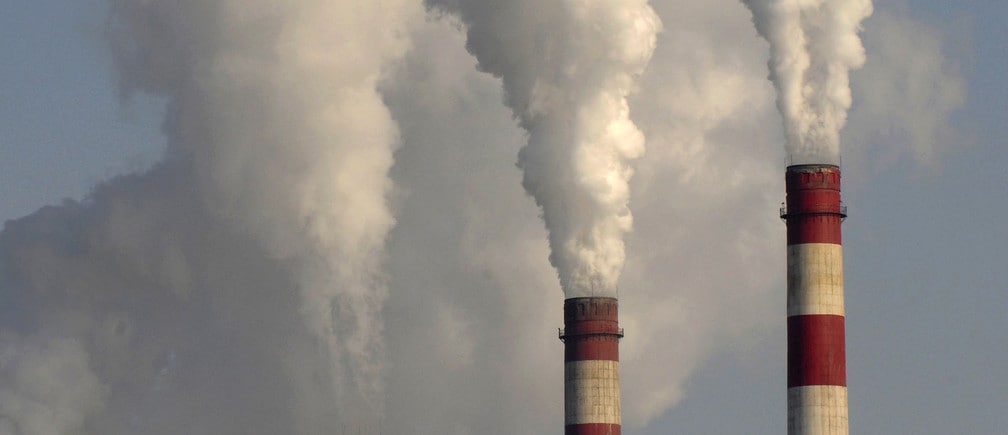Could carbon pricing be the answer to climate change?

Putting a price on carbon pollution must become part of a set of actions to future-proof our economies and societies.
Image: REUTERS/Stringer
Feike Sijbesma
Member Board of Trustees, World Economic Forum; Co-Chair, Global Climate Adaptation Centers; Honorary Chair, Royal DSMStay up to date:
Climate Crisis
BONN – The hurricanes that pummeled the Caribbean, Texas, and Florida this year left highways submerged, homes and businesses demolished, and lives lost. The floodwaters have since receded, but the images of upheaval remain etched in our collective memory. Recovery will take years, perhaps decades, and it will cost billions of dollars.
Experts tell us that warming oceans are causing hurricanes to become more powerful, and other consequences of anthropogenic climate change – from severe droughts in the Horn of Africa to extreme flooding in Asia – are leaving millions without food and basic shelter. But while the link between burning fossil fuels and deadly weather has been strengthening for years, policymakers have not always heeded the warnings.
This is changing rapidly. Today, countries, citizens, and a growing number of businesses around the world are finally taking action. This month, thousands gathered for the UN’s climate change conference in Bonn, Germany, to ratchet up global ambition in the fight against climate change. Following the successful Paris climate agreement two years ago, expectations for further progress and continued collaboration are high.
One of the more promising recent initiatives is the Carbon Pricing Leadership Coalition (CPLC), which brings together 30 governments and more than 180 businesses and strategic partners to put a value on carbon dioxide emissions. The idea is simple: if we are to meet the Paris accord’s target of limiting the increase in global average temperature to less than 2° Celsius above preindustrial levels – ideally, to 1.5° above preindustrial levels – we must dramatically cut emissions. As co-chairs of the CPLC, we believe that one of the best ways to do that is by shifting the social and economic costs of heat-trapping gases from the public to the polluter.
With the sense of climate urgency increasing, it is no longer acceptable to pollute for free and pass the bill to future generations. Putting a price on carbon is the most efficient way to reduce global emissions while encouraging sustainable and robust economic growth. Moreover, by putting a price on pollution, governments can generate revenue for investments like clean energy, schools, and health care, making it a double win.
The ultimate goal, of course, is to encourage businesses to clean up their acts, and today, a growing share of business leaders understand that pricing carbon is one of the best ways to combat climate change. They also recognize that their businesses can thrive even as they work to reduce emissions.
In fact, many business leaders are among the most enthusiastic supporters of effective carbon pricing. Just last month, the Carbon Disclosure Project revealed that the number of companies with plans to pursue internal carbon price mechanisms has grown to almost 1,400 globally, up from 150 in 2014. This includes more than 100 of the world’s largest companies, with total annual revenues of some $7 trillion. Royal DSM (which is led by one of the authors) has set a carbon price of €50 ($59) per ton, joining other global companies like Michelin, Danone, and General Motors in applying meaningful carbon prices to “future-proof” their business.
Some 40 countries – including Canada – are also putting a price on carbon pollution, and more governments are planning to implement similar schemes soon. In 2015, China announced plans to create the world’s largest carbon-pricing system. And earlier this year, Ontario, Québec, and California signed an agreement to create the world’s second-largest carbon market.

This trend must continue – for environmental and economic reasons. A May 2017 study conducted by the High-Level Commission on Carbon Prices – led by two of the world’s top economists, Joseph E. Stiglitz and Nicholas Stern – found that setting a “strong carbon price” is essential not only for reducing global emissions, but also for sustaining innovation and growth.
To be sure, putting a price on carbon pollution must become part of a broader set of actions to future-proof our economies and societies. To reduce greenhouse-gas emissions further and foster economic vitality, we must improve public transportation; construct energy-efficient buildings; and support efforts by businesses, innovators, and investors to develop clean-energy solutions. This is what Canada is already doing, because we know that these policies can reduce emissions and help create new, well-paying jobs.
As is often said, climate change represents both a challenge and an opportunity. By pricing carbon pollution and harnessing our collective abilities, we can address the former and seize the latter. Pooling the innovative and entrepreneurial spirit found in countries and businesses will enable us to fight climate change, strengthen our economies and societies, and leave our children and grandchildren a healthier planet.
Don't miss any update on this topic
Create a free account and access your personalized content collection with our latest publications and analyses.
License and Republishing
World Economic Forum articles may be republished in accordance with the Creative Commons Attribution-NonCommercial-NoDerivatives 4.0 International Public License, and in accordance with our Terms of Use.
The views expressed in this article are those of the author alone and not the World Economic Forum.
Related topics:
Forum Stories newsletter
Bringing you weekly curated insights and analysis on the global issues that matter.
More on Climate ActionSee all
Will Hicks and Louise Thomas
July 3, 2025
David Elliott
July 1, 2025
Tim Lenton and Steve Smith
June 30, 2025
Muhammad Hassan Dajana and James Balzer
June 27, 2025
Park Jae-Pil
June 26, 2025
David Elliott
June 25, 2025





